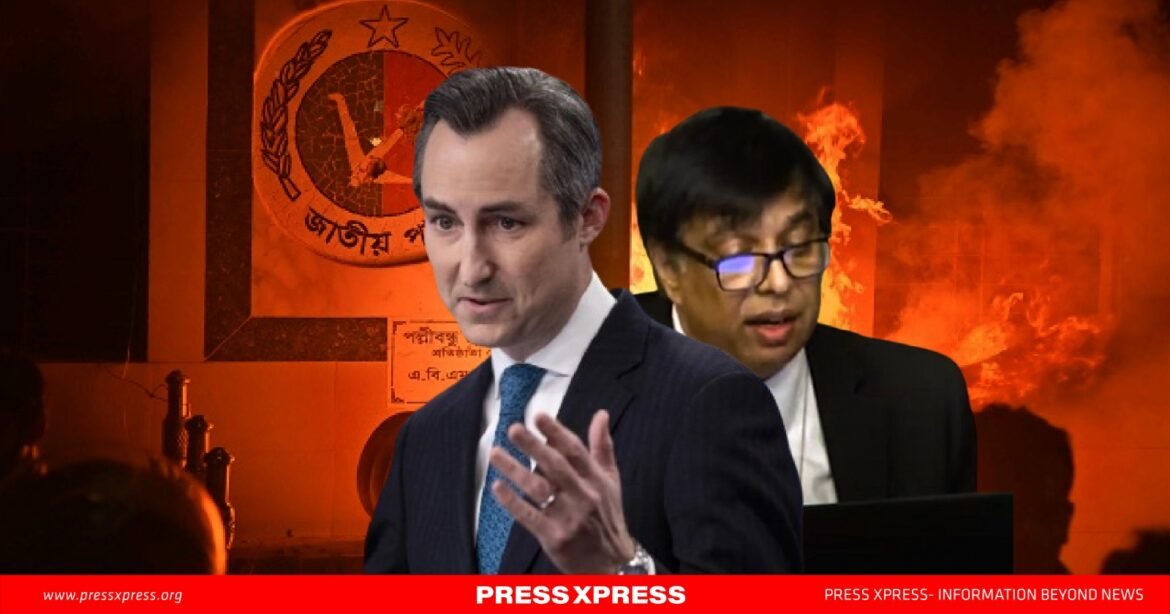During a routine press briefing on October 4, U.S. State Department spokesperson Matthew Miller addressed recent developments in Bangladesh concerning press freedom, political expression, and religious rights. These responses answered questions from Dastagir Jahangir, the USA Bureau Chief of Press Xpress.
Miller’s answers, while measured, signaled a broader U.S. stance on supporting democratic freedoms and human rights in Bangladesh.
Revocation of Press Accreditation for Bangladeshi Journalists
The first question addressed the decision by Bangladesh’s Information Department to revoke press accreditations for 20 journalists. The list includes prominent figures like Iqbal Sobhan Chowdhury, Shaban Mahmood, Mujammel Haque Babu, Shakil Ahmed, and Shymol Dotto. Jahangir highlighted concerns that this move appears to restrict press freedom and limits journalists’ ability to work without government interference, potentially undermining democratic values.
Miller’s response did not directly address the specifics of the revocation or the individual cases involved but underscored the U.S. stance on global press freedom. “I don’t have any specific comment on those reported charges,” Miller noted, “but we support the free press in Bangladesh as we do around the world.” While he refrained from explicit criticism, Miller’s answer pointedly reaffirmed the importance of press freedom as a fundamental democratic principle. This statement, though broad, reflects a likely U.S. concern about the implications of restricting journalistic freedom in Bangladesh. Given the emphasis the U.S. places on freedom of information, Miller’s comments suggest that any action limiting press independence will continue to draw international attention, especially in the lead-up to Bangladesh’s upcoming elections.
Political Expression and the Jatiya Party
The briefing then moved to discuss issues surrounding the Jatiya Party, one of Bangladesh’s largest political parties. According to reports, the party’s central office was vandalized and burned, allegedly by an Anti-Discrimination Student Organization backed by the interim government. Following this, the Bangladeshi government imposed Section 144, a law banning Jatiya Party gatherings and protests scheduled for November 2.
In response, Miller emphasized the U.S. commitment to supporting freedoms of belief, expression, and peaceful assembly. “We are monitoring reports of protests in Bangladesh,” Miller said, adding that the U.S. considers these freedoms “essential elements of any democracy and the welfare of all persons in Bangladesh and, as I said, around the world.” His response reflects the U.S. State Department’s cautious approach in addressing Bangladesh’s domestic political climate, reaffirming its support for democratic rights without openly criticizing the Bangladeshi government’s handling of opposition gatherings. Miller’s comments imply that the U.S. expects Bangladesh to allow political expression, even during transitional or contentious periods.
Miller’s statement also signals that Washington is observing the treatment of opposition parties closely. The U.S. has previously expressed its desire for a fair and inclusive political process in Bangladesh, and Miller’s response suggests that any potential marginalization of opposition voices will be a focus of ongoing U.S. diplomatic engagement with Dhaka.
Sedition Charges Against Hindu Leaders and Religious Freedom
The final question addressed recent sedition charges filed against 19 Hindu leaders in Bangladesh, including ISKCON’s Chinmoy Prabhu. Jahangir raised concerns that these charges might threaten religious freedom and minority rights in Bangladesh, given that the individuals charged belong to a religious minority.
Miller’s answer, though brief, reaffirmed the U.S. commitment to a fair and transparent legal process for all individuals. “We are aware of the charges,” he stated, “and we encourage a fair and transparent legal process for all individuals.” This response subtly underscores the U.S. expectation that Bangladesh’s government handle such cases with judicial integrity, especially given that the charges involve a religious minority group. While Miller did not directly criticize the charges or imply any religious bias, his emphasis on transparency and fairness signals that Washington is closely watching how Bangladesh treats religious minorities and adheres to principles of religious freedom.
The statement serves as a reminder of the U.S. commitment to religious freedoms and minority rights, particularly relevant in a context where the government’s actions could be perceived as disproportionately affecting certain communities. Miller’s emphasis on legal transparency aligns with the broader U.S. stance on human rights, reinforcing the message that religious freedoms should be protected alongside political freedoms.


